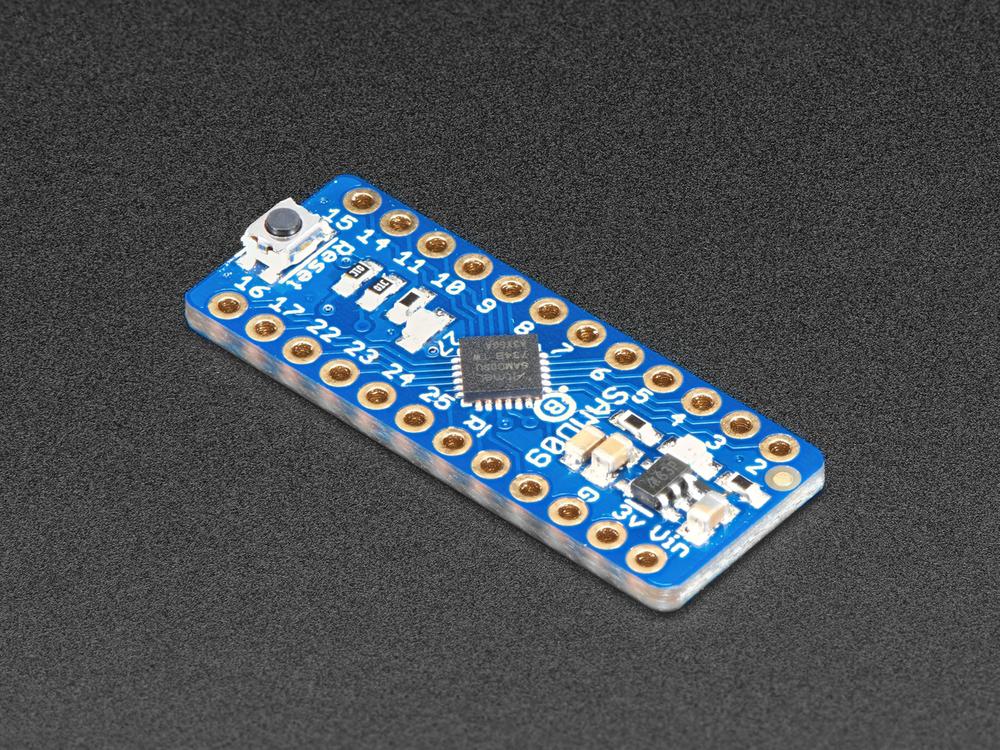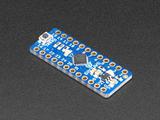Adafruit ATSAMD09 Breakout with seesaw

Description
Adafruit seesaw offers a flexible, near-universal converter framework, expanding hardware support for any I2C-compatible microcontroller or microcomputer. Avoid cluttered setups by using seesaw instead of multiple separate I2C modules.
The ATSAMD09 breakout equipped with seesaw provides:
- 3 x 12-bit ADC inputs
- 3 x 8-bit PWM outputs
- 7 x GPIO with selectable pullup/pulldown
- 1 x NeoPixel output for up to 63 pixels
- 1 x EEPROM with 64 bytes NVM memory
- 1 x Interrupt output
- 2 x I2C address selection pins
- 1 x Activity LED
Reconfigure the chip for various peripherals like a UART converter, although not included in the default firmware. Perfect for developing seesaw capabilities, or use it out-of-the-box for enhanced Raspberry Pi or ESP8266 support.
Note: Breakouts require a J-Link for bootloader development, with recommendations for an SWD adapter breakout. Compatible with Atmel Studio; potential for compatibility with ARM GCC and a Makefile. Ideal for Maker community experimentation, avoiding custom build support. Supplemental documentation and libraries for major platforms provided in the Adafruit seesaw guide.
Properties
| Brand | Adafruit |
| Model | 3657 |
Delivered in 10 to 30 days
Alternative products
Customer questions
Customer Reviews
Suggested products
- In stock Adafruit Waterproof DC Power Cable Set - 5.5/2.1mm € 3,25 View product
- 3 pieces In stock Adafruit LED Filament - 3V 26mm long - Warm White 3 Pack € 5,50 View product
- In stock Adafruit Breadboard-friendly SPDT Slide Switch € 1,25 View product
- In stock Adafruit Small Enclosed Piezo w/Wires € 1,25 View product
- In stock Adafruit NOOds - Flexible LED Filament - 3V 300mm long - Blue € 9,25 View product
- In stock Adafruit I2S 3W Class D Amplifier Breakout - MAX98357A € 7,50 View product
- In stock Adafruit NOOds - Flexible LED Filament - 3V 300mm long - Lime Green € 8,50 View product
- In stock Adafruit NOOds - Flexible LED Filament - 3V 300mm long - Warm White € 5,50 View product
- In stock Adafruit Mini Metal Speaker w/ Wires - 8 ohm 0.5W € 2,50 View product
- In stock Adafruit Pressure-Sensitive Conductive Sheet (Velostat/Linqstat) € 6,25 View product
- In stock Adafruit Small Alligator Clip to Male Jumper Wire Bundle - 6 Pieces € 6,40 View product
- In stock Adafruit Single ended nOOds - 128mm long Flexible LED Filament - Blue 3V € 5,- View product
- In stock Adafruit Micro Lipo - USB LiIon/LiPoly charger € 7,50 View product
- 5 pieces In stock Adafruit NeoPixel Diffused 5mm Through-Hole LED - 5 Pack € 6,25 View product
- In stock Adafruit Woven Conductive Fabric - 20cm square € 6,25 View product










